God Sleeps in Rwanda The Death of Kevin Carter The Mushroom Club
"It is so fine a document of the causes and effects, the results and cravings of this war, that ... everyone should hear it once every six months for the next decade. Then, maybe we will not forget, and then, maybe we'll have no more wars."
-- BILLBOARD Magazine, May 1945
The Golden Age of Norman Corwin
Director: Eric Simonson
USA, 2005, 40 minutes, in English
~ Author Studs Terkel
"... I can recite 'On A Note Of Triumph' from memory ... that prayer at the end is something I know like little children know The Lord's Prayer."
~ Director Robert Altman
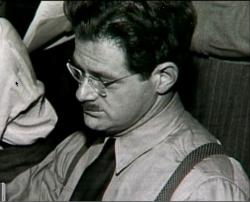
Click on any of the topics below or scroll down the page.
Synopsis
About Norman Corwin
About the Filmmakers
Awards & Festival Screenings
"On a Note of Triumph" 1945
SYNOPSIS [Back to Top]
Norman Corwin is one of those historical curiosities that arise every so often: he is famous, yet today few people know him. He is enormously influential, yet his work is seldom broadcast. It is more likely you know the work of his protégés - Corwin has been an inspiration to and a primary influence upon such notables as Edward R. Murrow, Charles Kuralt, Walter Cronkite, Stan Freberg, Robert Altman, Norman Lear, Rod Serling and Ray Bradbury.
In reality, Corwin is one of the greatest living American writers - working in various media - writing for newspapers, radio, stage, television and the movies. His books include "Trivializing America," and "Holes In A Stained Glass Window," plus a multitude of essays, articles, poetry and stage plays. His movie script for Lust For Life, won him an Oscar nomination and his other screenplays include The Story of Ruth, The Blue Veil, Forever and a Day, The Naked Maja, and Once Upon a Time.
According to Cronkite, "Back in the early 40s Norman Corwin was nearly as well known as FDR, and much admired. His brilliant poetry, dramas, documentaries and fantasies reached into American homes and across the ocean as far as radio waves could carry his words. Norman Corwin was considered the poet laureate of radio's Golden Age."
In his Oscar-winning documentary short film, "A Note of Triumph: The Golden Age of Norman Corwin," director Eric Simonson explores the lasting impact of radio broadcasting legend Norman Corwin's work and focuses on his landmark 1945 piece, "On a Note of Triumph," and how it remains eerily prescient in light of today's current events.
America came to a stop for that CBS broadcast, heard by nearly half of the country's 140 million citizens and re-aired on competing networks in subsequent days, in which Corwin delivered his famous reflections on freedom and peace to commemorate VE (Victory in Europe) Day on May 5, 1945. That radio program galvanized and electrified the nation and was a moment that would mark the end of a long national struggle, and in another sense, set a new standard for the art of radio drama.
The film includes interviews with Corwin contemporaries such as Walter Cronkite, Studs Terkel and Robert Altman, and Corwin himself, who at age 95 is teaching at the University of Southern California and hasn't lost a bit of his brilliance. But the real magic in this work is generated by Corwin's words, spoken in vintage radio broadcasts by the likes of Jimmy Stewart, Edward G. Robinson and Orson Welles. Corwin's goodness, decency, and belief in principles sends a message that is just as important today as it was sixty years ago.
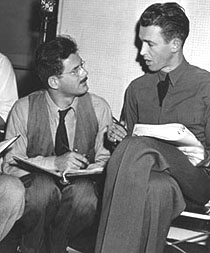
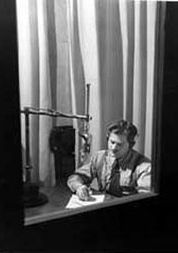
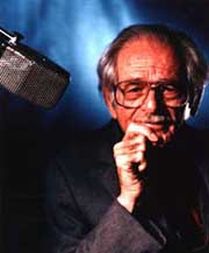
Norman & Jimmy Stewart, 1941 narrating "One World Flight" 1947 2005
ABOUT NORMAN CORWIN [Back to Top]
In the late 1930's Bill Paley wanted the CBS radio network to be competitive with a much larger (and richer) NBC network. One approach was the introduction of an on-air poet, Norman Corwin. A flamboyant performer in the mold of Orson Welles, who himself once intoned Corwin's muscular verse, Corwin was a resounding success, with millions of listeners gaining inspiration from his words. Corwin sported a pencil moustache and a shock of electrified black hair; the vintage photo below testifies to contemporary fascination with his expressive gestures.
Now amost a forgotten figure, Norman Corwin was the unofficial poet laureate of WWII America. His December 1941 radio broadcast "We Hold These Truths" captured many millions of listeners, as did his "On a Note of Triumph" in May, 1945. This exclamatory celebration of VE-Day ("Take a bow, G.I. Take a bow, little guy"), was praised by Carl Sandburg as "one of the great American poems." Writer/Director Norman Corwin is considered by many observers to be the world's foremost writer in the Golden Age of Radio, where he rose to the pinnacle as he "survived ten years in radio without ever having or needing a sponsor." He is the recipient of the One World Award, two Peabody Medals, an Oscar nomination, an Emmy, a Golden Globe, a duPont-Columbia Award, and was inducted into the Radio Hall of Fame.
In addition to his radio dramas, comedies and documentaries, Corwin is the author of 17 books, five stage plays, and numerous movie and TV works. His professional and academic credits include visiting lectureship at five major universities. Currently, Mr. Corwin teaches at the University of Southern California. In 1995, a collection of his letters was published by Barricade Books, which includes correspondence with Edward R. Murrow, Orson Welles, Bette Davis, Groucho Marx, and Carl Sandburg. In January 2001, he completed writing/directing a series of dramatic specials for public radio, "More By Corwin," starring Walter Cronkite, Hume Cronyn, Charles Durning, Martin Landau, Jack Lemmon, William Shatner, and Carl Reiner, among many others.
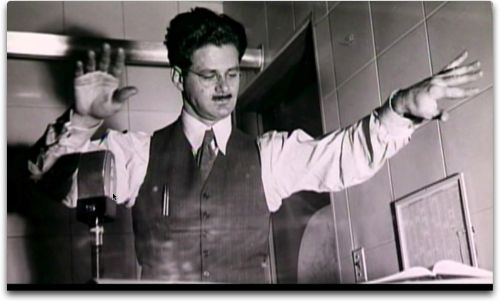
Norman Corwin strikes a Stokowskian pose while reciting on-the-air...
Back In 1946, radio dramatist Norman Corwin was named the first recipient of the "One World Flight" Award. His prize -- a 4 month, around-the-world trip patterned after the historic diplomatic flight of Statesman Wendell Willkie. Later recipients of this award would include Albert Einstein and New York Mayor, Fiorello LaGuardia. Corwin used his global journey to produce a series of thirteen radio documentaries for CBS -- recording over a hundred hours of voices, collected over four months, covering 37,000 miles.
Armed with a heavy wire recorder Corwin spoke with politicians, street sweepers, spiritual leaders, housewives, students - reaching out to the famous and non famous - recording their thoughts on the meaning of World War II and the possibilities for peace and humanity in the future. Corwin recorded not only these conversations, but the ceremonies, rituals and sounds of the cities, towns and villages that he passed through on his "One World Flight." Of Corwin's mission, playwright Jerome Lawrence observed, "It was good to send a poet around the world. He has a way of listening to the rhythms of tomorrow."
Over fifty years later, at age 89, Corwin revisited his global odyssey with NPR's award winning producer Mary Beth Kirchner for "Lost & Found Sound," playing excerpts and providing commentary about his CBS programs, which were a personal view of a battle-weary post-war world.
Learn more about Norman Corwin:
ABOUT THE FILMMAKERS [Back to Top]
Director Eric Simonson is a company member of the famed Steppenwolf Theatre Company in Chicago, where he has directed, adapted and acted in numerous productions including Nomathemba and The Song of Jacob Zulu (also on Broadway, Tony Nomination for Best Director).
It was with these stage plays where Simonson originally collaborated with Joseph Shabablala and the musical group Ladysmith Black Mambazo. His work with Mambazo inspired him to direct and produce the short documentary film 'On Tip Toe: Gentle Steps to Freedom' which was presented by HBO's ReelLife, garnered the IDA Distinguished Achievement Award, and was nominated for both an Academy Award and an Emmy Award in 2001.
Other film directing credits include 'Hamlet', co-directed and starring Campbell Scott for Hallmark Hall of Fame, 'Ladies Room L.A.', which was featured at over forty film festivals, and the independent feature 'Topa Topa Bluffs'. Numerous stage directing and writing credits include work with Primary Stages, The Huntington Theatre, The Kennedy Center, Minnesota Opera, Seattle Rep, LA Theatreworks, Missouri Rep, Milwaukee Rep and the Perth Arts Festival in Australia, among many others. He is the recipient of the Princess Grace Award and the NCCJ Media Arts Award.
Producer Corinne Marrinan, alongside director Eric Simonson and producer Leelai Demoz, co-produced the short documentary film 'On Tip Toe: Gentle Steps to Freedom' which was presented by HBO's ReelLife, garnered the IDA Distinguished Achievement Award, and was nominated for both an Academy Award and an Emmy Award in 2001.
Corinne is currently an Associate Producer for the CBS dramas CSI: Crime Scene Investigation, CSI: Miami and CSI: NY, in addition to co-authoring the CSI: Companion published by Simon and Schuster. Prior to working in film and television, she was a Stage Manager for thirteen years, having worked with The Goodman Theatre, The Huntington Theatre and the Royal National Theatre of Great Britain, among many others. She is a graduate of the Boston University Theatre.
AWARDS & FESTIVAL SCREENINGS [Back to Top]
Winner, Acadamy Award (Oscar) for Best Documentary Short 2005;
Honorable Mention at the Ojai Film Festival 2005;
Santa Fe Film Festival Selection;
Nominated for an International Documentary Association Award 2005;
DocuFest-Wilmington Selection.
ON A NOTE OF TRIUMPH [Back to Top]
"On a Note of Triumph" was a radio drama created at the request of President of Roosevelt. The work concluded with a prayer in poetic form.
Norman Corwin wrote for the ear, not the eye. One memorable line in the prayer below confirms beyond doubt that his writing is intended to be voiced aloud:
Post proofs that brotherhood is not so wild a dream
as those who profit by postponing it pretend
Read the words that follow -- out loud -- and imagine sixty million war-weary Americans hanging on your every word...
ON A NOTE OF TRIUMPH (Prayer)
[Back to Top]
Synopsis
About Norman Corwin
About the Filmmakers
Awards & Festival Screenings
"On a Note of Triumph" 1945
SYNOPSIS [Back to Top]
Norman Corwin is one of those historical curiosities that arise every so often: he is famous, yet today few people know him. He is enormously influential, yet his work is seldom broadcast. It is more likely you know the work of his protégés - Corwin has been an inspiration to and a primary influence upon such notables as Edward R. Murrow, Charles Kuralt, Walter Cronkite, Stan Freberg, Robert Altman, Norman Lear, Rod Serling and Ray Bradbury.
In reality, Corwin is one of the greatest living American writers - working in various media - writing for newspapers, radio, stage, television and the movies. His books include "Trivializing America," and "Holes In A Stained Glass Window," plus a multitude of essays, articles, poetry and stage plays. His movie script for Lust For Life, won him an Oscar nomination and his other screenplays include The Story of Ruth, The Blue Veil, Forever and a Day, The Naked Maja, and Once Upon a Time.
According to Cronkite, "Back in the early 40s Norman Corwin was nearly as well known as FDR, and much admired. His brilliant poetry, dramas, documentaries and fantasies reached into American homes and across the ocean as far as radio waves could carry his words. Norman Corwin was considered the poet laureate of radio's Golden Age."
In his Oscar-winning documentary short film, "A Note of Triumph: The Golden Age of Norman Corwin," director Eric Simonson explores the lasting impact of radio broadcasting legend Norman Corwin's work and focuses on his landmark 1945 piece, "On a Note of Triumph," and how it remains eerily prescient in light of today's current events.
America came to a stop for that CBS broadcast, heard by nearly half of the country's 140 million citizens and re-aired on competing networks in subsequent days, in which Corwin delivered his famous reflections on freedom and peace to commemorate VE (Victory in Europe) Day on May 5, 1945. That radio program galvanized and electrified the nation and was a moment that would mark the end of a long national struggle, and in another sense, set a new standard for the art of radio drama.
The film includes interviews with Corwin contemporaries such as Walter Cronkite, Studs Terkel and Robert Altman, and Corwin himself, who at age 95 is teaching at the University of Southern California and hasn't lost a bit of his brilliance. But the real magic in this work is generated by Corwin's words, spoken in vintage radio broadcasts by the likes of Jimmy Stewart, Edward G. Robinson and Orson Welles. Corwin's goodness, decency, and belief in principles sends a message that is just as important today as it was sixty years ago.



Norman & Jimmy Stewart, 1941 narrating "One World Flight" 1947 2005
ABOUT NORMAN CORWIN [Back to Top]
In the late 1930's Bill Paley wanted the CBS radio network to be competitive with a much larger (and richer) NBC network. One approach was the introduction of an on-air poet, Norman Corwin. A flamboyant performer in the mold of Orson Welles, who himself once intoned Corwin's muscular verse, Corwin was a resounding success, with millions of listeners gaining inspiration from his words. Corwin sported a pencil moustache and a shock of electrified black hair; the vintage photo below testifies to contemporary fascination with his expressive gestures.
Now amost a forgotten figure, Norman Corwin was the unofficial poet laureate of WWII America. His December 1941 radio broadcast "We Hold These Truths" captured many millions of listeners, as did his "On a Note of Triumph" in May, 1945. This exclamatory celebration of VE-Day ("Take a bow, G.I. Take a bow, little guy"), was praised by Carl Sandburg as "one of the great American poems." Writer/Director Norman Corwin is considered by many observers to be the world's foremost writer in the Golden Age of Radio, where he rose to the pinnacle as he "survived ten years in radio without ever having or needing a sponsor." He is the recipient of the One World Award, two Peabody Medals, an Oscar nomination, an Emmy, a Golden Globe, a duPont-Columbia Award, and was inducted into the Radio Hall of Fame.
In addition to his radio dramas, comedies and documentaries, Corwin is the author of 17 books, five stage plays, and numerous movie and TV works. His professional and academic credits include visiting lectureship at five major universities. Currently, Mr. Corwin teaches at the University of Southern California. In 1995, a collection of his letters was published by Barricade Books, which includes correspondence with Edward R. Murrow, Orson Welles, Bette Davis, Groucho Marx, and Carl Sandburg. In January 2001, he completed writing/directing a series of dramatic specials for public radio, "More By Corwin," starring Walter Cronkite, Hume Cronyn, Charles Durning, Martin Landau, Jack Lemmon, William Shatner, and Carl Reiner, among many others.

Norman Corwin strikes a Stokowskian pose while reciting on-the-air...
Back In 1946, radio dramatist Norman Corwin was named the first recipient of the "One World Flight" Award. His prize -- a 4 month, around-the-world trip patterned after the historic diplomatic flight of Statesman Wendell Willkie. Later recipients of this award would include Albert Einstein and New York Mayor, Fiorello LaGuardia. Corwin used his global journey to produce a series of thirteen radio documentaries for CBS -- recording over a hundred hours of voices, collected over four months, covering 37,000 miles.
Armed with a heavy wire recorder Corwin spoke with politicians, street sweepers, spiritual leaders, housewives, students - reaching out to the famous and non famous - recording their thoughts on the meaning of World War II and the possibilities for peace and humanity in the future. Corwin recorded not only these conversations, but the ceremonies, rituals and sounds of the cities, towns and villages that he passed through on his "One World Flight." Of Corwin's mission, playwright Jerome Lawrence observed, "It was good to send a poet around the world. He has a way of listening to the rhythms of tomorrow."
Over fifty years later, at age 89, Corwin revisited his global odyssey with NPR's award winning producer Mary Beth Kirchner for "Lost & Found Sound," playing excerpts and providing commentary about his CBS programs, which were a personal view of a battle-weary post-war world.
Learn more about Norman Corwin:
- Walter Cronkite and Norman Lear on Norman Corwin (audio)
- Excerpts - "We Hold These Truths" - Jimmy Stewart (audio)
- "We Hold These Truths" - complete broadcast (audio)
- "This I Believe" (audio and text) plus Excerpts from On a Note of Triumph -- "Take a Bow, GI..." (audio) and "The Prayer" (audio and text)
- "One World Flight" - NPR interview (text)
- Eight decades into his remarkable career, professor Norman Corwin still revels in the power of words (text)
- Norman Corwin on his role as screenwriter of "Lust for Life" (text)
ABOUT THE FILMMAKERS [Back to Top]
Director Eric Simonson is a company member of the famed Steppenwolf Theatre Company in Chicago, where he has directed, adapted and acted in numerous productions including Nomathemba and The Song of Jacob Zulu (also on Broadway, Tony Nomination for Best Director).
It was with these stage plays where Simonson originally collaborated with Joseph Shabablala and the musical group Ladysmith Black Mambazo. His work with Mambazo inspired him to direct and produce the short documentary film 'On Tip Toe: Gentle Steps to Freedom' which was presented by HBO's ReelLife, garnered the IDA Distinguished Achievement Award, and was nominated for both an Academy Award and an Emmy Award in 2001.
Other film directing credits include 'Hamlet', co-directed and starring Campbell Scott for Hallmark Hall of Fame, 'Ladies Room L.A.', which was featured at over forty film festivals, and the independent feature 'Topa Topa Bluffs'. Numerous stage directing and writing credits include work with Primary Stages, The Huntington Theatre, The Kennedy Center, Minnesota Opera, Seattle Rep, LA Theatreworks, Missouri Rep, Milwaukee Rep and the Perth Arts Festival in Australia, among many others. He is the recipient of the Princess Grace Award and the NCCJ Media Arts Award.
Producer Corinne Marrinan, alongside director Eric Simonson and producer Leelai Demoz, co-produced the short documentary film 'On Tip Toe: Gentle Steps to Freedom' which was presented by HBO's ReelLife, garnered the IDA Distinguished Achievement Award, and was nominated for both an Academy Award and an Emmy Award in 2001.
Corinne is currently an Associate Producer for the CBS dramas CSI: Crime Scene Investigation, CSI: Miami and CSI: NY, in addition to co-authoring the CSI: Companion published by Simon and Schuster. Prior to working in film and television, she was a Stage Manager for thirteen years, having worked with The Goodman Theatre, The Huntington Theatre and the Royal National Theatre of Great Britain, among many others. She is a graduate of the Boston University Theatre.
AWARDS & FESTIVAL SCREENINGS [Back to Top]
Winner, Acadamy Award (Oscar) for Best Documentary Short 2005;
Honorable Mention at the Ojai Film Festival 2005;
Santa Fe Film Festival Selection;
Nominated for an International Documentary Association Award 2005;
DocuFest-Wilmington Selection.
ON A NOTE OF TRIUMPH [Back to Top]
"On a Note of Triumph" was a radio drama created at the request of President of Roosevelt. The work concluded with a prayer in poetic form.
Norman Corwin wrote for the ear, not the eye. One memorable line in the prayer below confirms beyond doubt that his writing is intended to be voiced aloud:
as those who profit by postponing it pretend
Read the words that follow -- out loud -- and imagine sixty million war-weary Americans hanging on your every word...
ON A NOTE OF TRIUMPH (Prayer)
Lord God of trajectory and blast
Whose terrible sword has laid open the serpent
So it withers in the sun for the just to see,
Sheathe now the swift avenging blade with the names of nations writ on it,
And assist in the preparation of the ploughshare.
Lord God of fresh bread and tranquil mornings,
Who walks in the circuit of heaven among the worthy,
Deliver notice to the fallen young men
That tokens of orange juice and a whole egg appear now before the hungry children;
That night again falls cooling on the earth as quietly as when it leaves your hand;
That Freedom has withstood the tyrant like a Malta in a hostile sea,
And that the soul of man is surely a Sevastopol which goes down hard and leaps from ruin quickly.
Lord God of the topcoat and the living wage
Who has furred the fox against the time of winter
And stored provender of bees in summer's brightest places,
Do bring sweet influences to bear upon the assembly line:
Accept the smoke of the mill town among the accredited clouds of the sky:
Fend from the wind with a house and hedge, him whom you made in your image,
And permit him to pick of the tree and the flock
That he may eat today without fear of tomorrow
And clothe himself with dignity in December.
Lord God of test-tube and blueprint
Who jointed molecules of dust and shook them till their name was Adam,
Who taught worms and stars how they could live together,
Appear now among the parliaments of conquerors and give instruction to their schemes:
Measure out new liberties so none shall suffer for his father's color or the credo of his choice:
Post proofs that brotherhood is not so wild a dream as those who profit by postponing it pretend:
Sit at the treaty table and convoy the hopes of the little peoples through expected straits,
And press into the final seal a sign that peace will come for longer than posterities can see ahead,
That man unto his fellow man shall be a friend forever.
Whose terrible sword has laid open the serpent
So it withers in the sun for the just to see,
Sheathe now the swift avenging blade with the names of nations writ on it,
And assist in the preparation of the ploughshare.
Lord God of fresh bread and tranquil mornings,
Who walks in the circuit of heaven among the worthy,
Deliver notice to the fallen young men
That tokens of orange juice and a whole egg appear now before the hungry children;
That night again falls cooling on the earth as quietly as when it leaves your hand;
That Freedom has withstood the tyrant like a Malta in a hostile sea,
And that the soul of man is surely a Sevastopol which goes down hard and leaps from ruin quickly.
Lord God of the topcoat and the living wage
Who has furred the fox against the time of winter
And stored provender of bees in summer's brightest places,
Do bring sweet influences to bear upon the assembly line:
Accept the smoke of the mill town among the accredited clouds of the sky:
Fend from the wind with a house and hedge, him whom you made in your image,
And permit him to pick of the tree and the flock
That he may eat today without fear of tomorrow
And clothe himself with dignity in December.
Lord God of test-tube and blueprint
Who jointed molecules of dust and shook them till their name was Adam,
Who taught worms and stars how they could live together,
Appear now among the parliaments of conquerors and give instruction to their schemes:
Measure out new liberties so none shall suffer for his father's color or the credo of his choice:
Post proofs that brotherhood is not so wild a dream as those who profit by postponing it pretend:
Sit at the treaty table and convoy the hopes of the little peoples through expected straits,
And press into the final seal a sign that peace will come for longer than posterities can see ahead,
That man unto his fellow man shall be a friend forever.
[Back to Top]